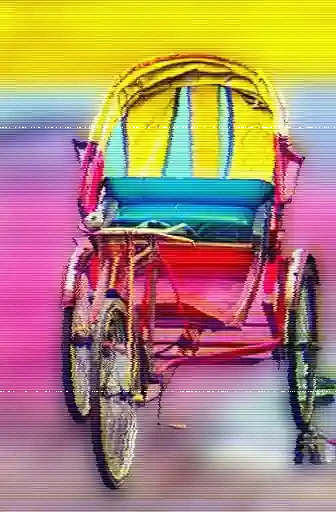(translated from Bhojpuri)

Jhagru felt as if his head was going to explode. How will he arrange so much money? Grain was expensive. They were out of bhaang. Not even a grain of rice in the house. Nobody had a decent piece of clothing on their bodies as well. ‘The month of Holi is here. You will be coming home, right? So when you come, bring some new clothes for us.’ Every alphabet of Radha’s letter roamed restlessly inside his head. But what could he do? When the odor of poverty began to stink in his village home, he had come running to the city. Jhagru was hardly 17-18 at the time. Seven miles away from his village, he had taken a train in Masrakh to reach the city, with dreams sparkling on the lids of both his eyes – the dreams of a sweet life.
Often, the memories of his village would serenade him, as if the village had some magical powers. Although he did not have land of his own, the lush farms and fields of the village would make Jhagru’s mind dance like a flute’s tune. Babu Ji’s and Bhaiya’s backbreaking hard work would get them employed as daily wage laborers, and the family would get squares of meals. But their job was not a permanent source of income. And whenever they would not get work, the entire night would be spent waiting for the sunrise. In the new world, where every man was for himself, the ration collected from daily wages would fill bellies for a month or two. After that, the same, vicious cycle of hunger would begin, and the same desperation to get a single grain of rice would ensue. Babu Ji would roam around from early morning till late evening, looking for work, and if some luck followed, the family would eat one meal. Yet, after all the trials and tribulations of that life, Jhagru felt that there was a certain peace in it somewhere, a certain happiness.
Jhagru began reminiscing about the gone days of his troublemaking boyhood. He would always get caught loitering around in one man’s house or another’s. To make it up, Jhagru would have to herd their goats or arrange fresh bamboo leaves. But he left behind his troublemaking days once he got married, as troublemaking did not seem as appealing to him as it did before. Now, he busied himself with daily wage labor. But there were days when he would get no work, and the family would sleep with only water in their empty stomachs. Jhagru would feel most pitiful for his wife, Radha, her famished lips, and dreary eyes. Shame would cloak him like a culprit. Radha’s sunken stomach would make him want to bury his face in humiliation somewhere. Youth, after all, should never be spent in suffering and scarcity. The slow, painful, deadly cycle of poverty did not seem ideal to Jhagru.
After crossing swords with the village elderly, Jhagru had eventually come to Patna. Maa had thought, ‘My son has gone to earn money. Better days must be just around the corner.’ But Babu Ji complained, ‘Everybody wants to become a saheb now. What’s there in the city anyway? And if everybody leaves for the city, who will look after the family? Who will help plow the fields?…’
Radha was heartbroken as well. After all, it had hardly been a year since she was wed to Jhagru. With her dusky complexion, round face, thick brows, and almond-shaped eyes, Radha was a beautiful woman. But what use was beauty if there were no proper clothes to cover her body?
‘I will bring a saree for you – a Banarasi saree, and a Cheent-print blouse. You see, I don’t wish to leave you too, but looking at the condition of our family, I have no choice but to leave and try my luck with something. Trust me, when I return, I’ll return with a lot of money…’ Jhagru consoled Radha. Radha’s young eyes glimmered with dreams. A bright smile embraced her face like the sky embraces a new moon. Jhagru’s heart felt less burdened.
Drowned in the bliss of these memories, Jhagru started pedaling his rickshaw faster. And his old rickshaw squeaked in response. A whole year had passed since Jhagru began pulling his rented rickshaw for a living. Every day, early morning, his rickshaw-pulling begins!
Station! Station!!
Kadamkuan! Rajinder Nagar!!
Looking for passengers, he would scream at top of his lungs, but none of it could earn him enough money. Instead, rich folk would often bargain for the fare. The usual fare from the station to Patna college was 10 annas, but many would hand over only 6 annas. When asked to pay the full fare, they would glare at him, as if inflation is affecting only them. The educated passengers talked big, flaunting their knowledge, but behaved like misers when it came down to paying the full fare.
How would money be saved like this? Jhagru did not have any drinking habits, nor did he spend his money going to the cinema. Whenever he would stand at the ticket window, Radha’s face would flash before his eyes. At times, he looked at the actresses on movie posters and believed it was his Radha who was smiling. Living with such pain, he had lost a significant amount of weight. Saving every last anna, Jhagru managed to send Rs. 125 back home.
He had thought he would buy new clothes for everyone back home, and would excitedly sing songs of Holi. But now, a real challenge lay ahead. Rickshaw pulling was not earning him any money.
The past day had gone without any income too. Moreover, he had to pay Rs. 2 to park his rickshaw. And hardly 10 annas were earned that day. To make things worse, the government had announced a new law out of nowhere – A ban on rickshaw pulling.
It did not make any sense. There were ministers and politicians everywhere, filling their corrupted bellies while kicking the poor in the gut. Eating delicacies every day, they would harass rickshaw pullers for minimal fares. Then had the audacity to lecture the poor on humility.
While giving speeches, they would wear the disguise of goodness. They all lacked integrity anyway, and were only after bribes and easy income. Underneath their white kurtis was hidden a mind of corruption.
Politicians were, after all, only after their own greed. Congressmen were utterly hopeless – corrupt! Corrupt! Corrupt! Yet, they wanted votes every five years. Wheat-rice was inaccessible. Water was unfit to drink. Schools had hiked their fees. Sattu was Rs. 2 per kilogram! But politicians were basking in the sun carefree!
Taxes were another problem hovering overhead! On everything, there was a tax imposed. Better would have been to impose a tax on useless talking, so politicians would have stopped their mindless chatter, worked for the public welfare instead, and stopped wasting commoners’ time by whining about their champagne problems. But the government seemed to impose taxes on mugs, buckets, and maybe on human bodies as well. Oh lord! Taxes appeared as if Draupadi’s garment. And with the same endlessness was increasing the lawlessness of these ministers and politicians!
The union had announced that rickshaws would not be peddled on the streets from the next day. But Jhagru was in desperate need of money. Holi was near – he needed to buy clothes for his family – clothes for Maa and Radha – the festival of Teej was approaching as well, and Radha needed new clothes! The four annas he earned that day were spent on the tea he had at the hotel. And strike from the next day! Rickshaw strike! Labour strike! Shopkeeper strike! School strike! College strike! And who knows how many more strikes! Strike! Strike! Patna shut down! Bihar shut down!
The next day, they would discuss jobs, by shutting down all the jobs. But would the minister listen to the common folk? Would he manage to take time out from his daily job of bribery and corruption? Because if the common folk stopped throwing money at their feet, how would they change their car motors every day? How the hell would they build three-five-storeys in Rajinder Nagar?
Jhagru spent the whole night thinking and decided that rickshaw-pulling should not stop. He was nobody’s servant, so he would not listen to anyone.
The next morning, Jhagru left for his daily rickshaw-pulling near the station. Under stress, his heart was growing heavier. He was in a dilemma over the strike – to participate or not? The thought of Radha’s saree upset him, but to feel better, he began singing – Write the name of my lover, o letter!
‘Oy! Rickshaw! B.N. College?’
‘No, sir.’
‘Why?’
‘Today is the rickshaw strike? No rickshaw-wallahs will be working.’
Jhagru was near the Bhikhna mountainside. Leaving the passenger behind, he peddled ahead. But two minutes later, he felt immense regret. He decided he would take the next passenger. Jhagru crossed Kadamkuan to reach the station. Unfortunately, there were no passengers.
‘Inquilab zindabad!’
‘Communist party zindabad!’
‘No more tyranny! No more tyranny!’
‘Give us jobs! Give us food!’
‘Communist party zindabad!’
The sky appeared to reverberate. People were marching in big groups. Jhagru’s feet froze. He looked here and there, finding a place to hide from the crowd. But the crowd had already seen him. One of the men asked, ‘Why aren’t you on strike?’
‘I am.’
‘Do you take us for fools? This bastard is pulling his rickshaw!’
‘Hey, do not swear! Can you see any passenger on the rickshaw?’
‘Still, why roam around in a rickshaw? Park it somewhere if you don’t want sticks and punches!’
‘Huh!’ Jhagru sighed in anger.
‘Beat this bastard up!’ Someone shouted from the crowd.
By the time Jhagru recovered his senses, his cheek had gone numb. Somebody pushed him from behind. Jhagru lost his balance and fell down from the rickshaw. The crowd started kicking him. His blood began to boil. His feet were all bruised and injured by now. Due to the rough fall, his teeth had begun to bleed, and his arms were sprained. With great difficulty, he managed to stand up.
Radha’s saree…taxes…Holi…strike – everything flashed before his eyes. The crowd of poor and peasants kept passing by Jhagru, giving him unpleasant looks, chanting – ‘Communist party zindabad!’ And Jhagru kept watching the show, tears brimming in his eyes.
Note on the Translation – The story is titled ‘The Holi Strike‘ (in Bhojpuri, ‘Holi Ke Hartal‘). It is by a writer called Roop Shree, but Google fails to provide any biographical information on him. With the translation of this short story, the aim is to pursue Bhojpuri literature as a genuine canon and invite more writers and translators to revive this endangered genre of writing, while also spreading the color and essence of Bhojpuri literature, language, and culture among readers and scholars.
Shubhangi is pursuing her Ph.D. on the plays of the revolutionary Bhojpuri playwright and performer, Bhikhari Thakur. She is also working on the translations of several Bhojpuri classics, including the works of Bhikhari Thakur, Ramnath Pandey, and Pandey Kapil. Her poems, stories, and articles have been published in publications such as The Blahcksheep, The Indian Review, Borderless, Booked For Life, and The Indian Periodical.




Leave a Reply